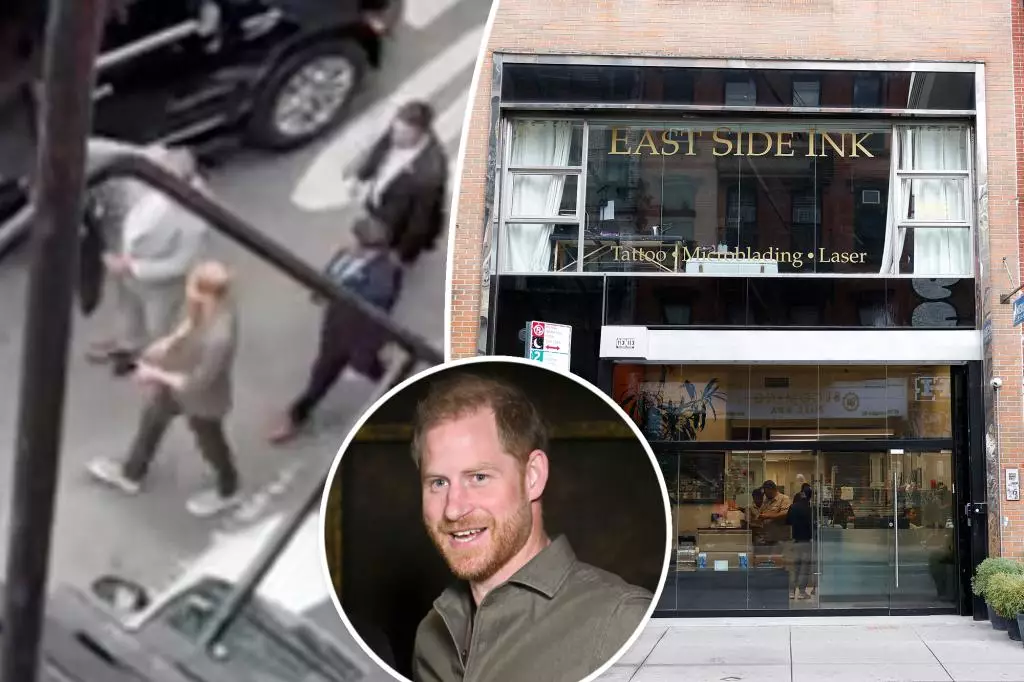On a seemingly ordinary Wednesday afternoon, Prince Harry made a sudden entrance into the realm of celebrity culture at East Side Ink, a renowned tattoo shop located in the Lower East Side of Manhattan. Known for its celebrity clientele, which includes members of the “Avengers” cast—Chris Hemsworth, Robert Downey Jr., Scarlett Johansson, Chris Evans, and Jeremy Renner—the shop has become synonymous with the kind of bold self-expression that tattoos symbolize. As the Duke of Sussex arrived in a sleek black SUV, interest palpable, it became clear that his visit was going to draw attention, and rightly so. Given his high-profile status, the intersection of celebrity and royalty in one location was too intriguing for onlookers to ignore.
Harry’s appearance was shrouded in a cloak of stringent security measures. Accompanying him was a team dressed in matching outfits of dark green slacks and gray polo shirts, hinting at the high stakes that come with royal visits. Notably, one of these figures donned a suit, likely affiliated with the New York Police Department, indicative of the additional layers of security Harry has received following a harrowing paparazzi incident earlier in 2023. The presence of NYPD vehicles flanking his SUV not only reinforced the seriousness of his situation but also served as a reminder of the paradox of celebrity: despite wealth and stature, vulnerability often lurks around the corner.
While speculation swirled about whether Harry was getting inked, insider sources eventually confirmed that the prince did not receive a tattoo during this visit. Instead, it was revealed that the purpose of his trip was more convoluted—intended as a promotional stunt for an upcoming project. This announcement raises questions about the line between authentic experiences and orchestrated public relations strategies in the lives of royals and celebrities. Did this publicity play diminish the artistic integrity of tattoo culture, or did it merely shine a spotlight on it? It appears that, even in jest, Harry and his team are keenly aware of the brand they have cultivated since stepping back from royal duties.
Interestingly, the prince managed to blend obligation with leisure during his trip. In addition to his visit to the tattoo shop, he also made an appearance on “The Tonight Show With Jimmy Fallon,” where he was seen experiencing a haunted house—an adventure tapping into the thrill-seeking side of his personality. Clad in the same forest green button-up and dark jeans in both venues, the consistency of his attire painted the picture of a man juggling diverse responsibilities, yet still keen to partake in moments of everyday joy. Harry’s willingness to embrace both royal duties and spontaneous fun demonstrates a modern redefinition of what it means to be a member of the royal family; it’s no longer about strict adherence to tradition but about connecting to the wider world in ways that resonate with younger generations.
While royal tattoos have historically been a rarity, they are not unprecedented. Harry’s cousin, Princess Eugenie, sports a discreet circle tattoo, which challenges the notion that royals must adhere strictly to a polished, untattooed image. The historical reluctance around body art in royal circles may stem from a desire to maintain an image of decorum and tradition. However, Harry’s open-mindedness about tattoos reflects the contemporary shift in societal norms concerning personal expression. Although it remains unconfirmed whether Harry has any ink of his own, his rebellious past, including candid discussions about drug use and parties, suggests that he is not one to shun the more unconventional aspects of identity that tattoos can represent.
Prince Harry’s jaunt to a tattoo shop symbolizes more than just a potential new piece of body art; it highlights a broader dialogue about identity, celebrity culture, and the evolving role of the modern royal. As he navigates the delicate balance between tradition and personal authenticity, Harry is redefining what it means to be a member of the royal family in the 21st century. In an age where A-listers often become advocates for social change and discussions on mental health, Harry is poised to channel his unique experiences into something meaningful, both for himself and for the legacy he wishes to create. The prince’s blending of duty and leisure allows for a refreshing perspective that humanizes royalty, making them more relatable to the public that both adores and scrutinizes them.

